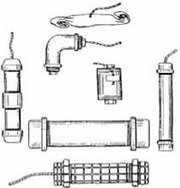
A pipe bomb is a simple type of improvised explosive device, a tightly sealed section of pipe filled with an explosive material. The containment provided by the pipe means that simple low explosives can be used to produce a relatively large explosion, and the fragmentation of the pipe itself creates potentially lethal shrapnel.
Premature detonation is a hazard of attempting to construct any homemade bomb, and the materials and methods used with pipe bombs make unintentional detonation incidents common, usually resulting in serious injury or death to the assembler.
In many countries the manufacture or possession of a pipe bomb is a serious crime, regardless of its intended use.
The bomb is usually a short section of steel water pipe containing the explosive mixture and closed at both ends with steel or brass caps. A fuse is inserted into the pipe with a lead running out through a hole in the side or capped end of the pipe. The fuse can be electric with wires leading to a timer and battery or can be a common wick such as used in most consumer fireworks. All components are fairly easily obtainable.
Generally high explosives such as TNT are not used, because these and the detonators they require are difficult to obtain. Such explosives also don't require the containment of a pipe bomb. Instead, any sort of explosive mixture the builder can find or make is used.
Some of the explosive mixtures used, such as black powder, match heads or chlorate mixtures are very prone to ignition by the friction and static electricity generated when packing the material inside the tube or attaching the end caps - accounting for many injuries or deaths amongst builders. If sharp objects, such as nails or broken glass, are added inside the bomb in an attempt to increase the amount of injury, these also add to the risk of premature ignition.
The addition of loosely fixed shrapnel material outside of the bomb can increase the danger of the explosion cheaply and easily. The Unabomber used this method by taping carpentry nails to the outside of his devices. Other variations include using scrap metal or ball bearings.
Devices made from plastic pipe, such as PVC, or thick walled cardboard tube would not be normally considered as "pipe bombs".